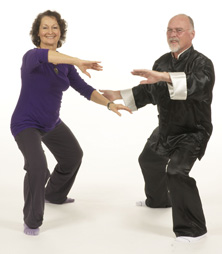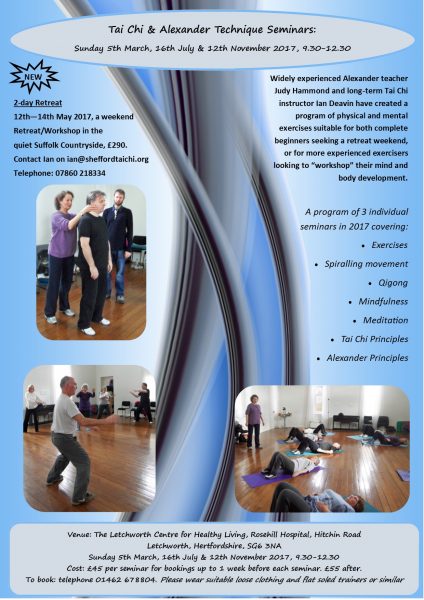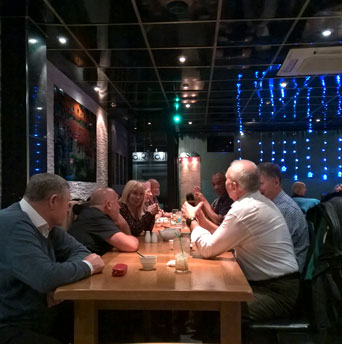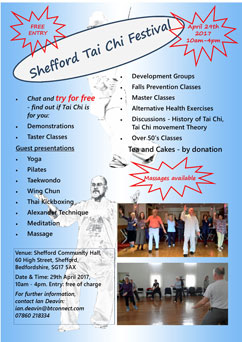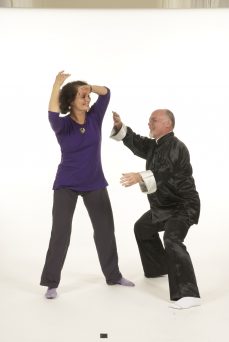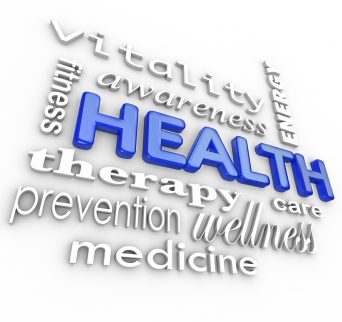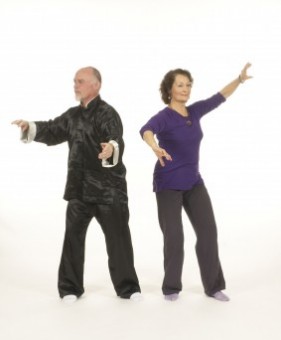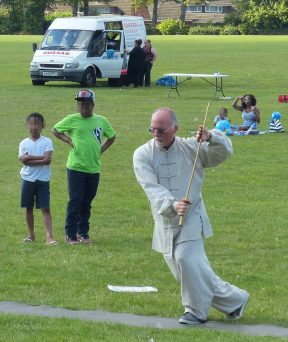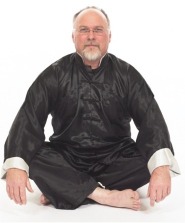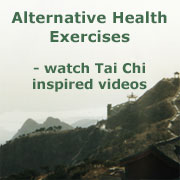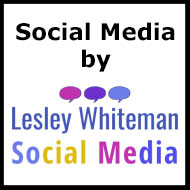The following article was recently published by Kindred Spirit magazine:
Over my many years of studying and teaching Tai Chi I have recognised that much of individual movement stems from habit – we learn to walk at around 1 year old and then pay it little attention to it until some 60 or so years later when, having accumulated many random poor habits of posture and movement, we notice a certain lessening of physical ability and vulnerability of balance usually coupled with physical and emotional tensions.
Along my journey with Tai Chi I came across Alexander Technique which also refers to habits of body use and of the way each part of the body relates to the others. Indeed, I have heard it expressed that “Tai Chi is Alexander Technique with movement.” So it is not surprising that when I met Judy Hammond – an experienced teacher of Alexander Technique – there was a meeting of minds around a shared interest in understanding and teaching healthy ways of moving and healthy living – helping us to live more comfortably and more capably with reduced pain, facilitating the body’s natural healing processes. Helping us to deal with the stresses of daily living. Common approaches include: relax and move, light upright posture, movement from the centre, a connected relationship within the body, passive elastic movement, mindful attention, thoughtful consideration of movement, sensitivity and awareness of body and emotions.
Such a common understanding led quite soon to us teaching joint seminars and now joint weekend retreats. Drawing on my own Tai Chi background from Yang Style to Chen Style and Judy’s Moving Mindfully approach, we have developed a unique synthesis – a way of working with exercises inspired by the two disciplines.
Further drawing on dance, meditation, visualisation and martial arts experience with a good measure of humour, these Alternative Health Exercises are suitable for beginners and experienced people who will also recognise common themes from other areas such as Yoga and Pilates. Our aim has been to bring together a simple and fun way to develop easy movement as an investment in self.
It is our observation that developing a skill in movement leads to a healthier mind and body with enhanced proprioception that enhances static and dynamic balance. Exercises work to develop inner awareness around the centre line of the body, head floating up, lower body sinking down (heaven and earth), a lithe connectedness, good posture at all times whether seated, standing or in dynamic movement. Meditation and visualisation are used as aids to this awareness and relaxation.
In a world where we every day experience the spectrum of life from the fun and enjoyable to the aggressiveness of simple conflicts – as one of my teachers once said: “It is easy to be enlightened on the top of a mountain with no distractions – just come down here where life comes at you like a conveyor belt and then try it!” (Vince Morris). In such a world many people find the natural relaxed movement of Tai Chi to be very therapeutic – both calming and healing. For some the isolation of quiet meditative movement enhances this experience as in solitary practice or individual sessions with a teacher; for others the physical and emotional closeness of group work keeps them grounded in human contact.
Whatever suits each person the core of Tai Chi movement provides a centre – a structure on which to develop a very special way of being – with at its heart a dedication to resilience, strength and understanding of change leading to a stronger body, mind and spirit. Big claims – but ones which many have found fulfilled.
In seeing Tai Chi as therapy, leading to personal development in its widest sense, we should be wary of thinking this might be an “airy fairy” program. On the contrary, it is – or at least can be – a very practical down to earth skill set derived from much practice and hard work with its full measure of fun and challenge. Tai Chi viewed in this way can be understood as a very personal investment in oneself – an investment in future old age and learning to look after yourself – physically, mentally and emotionally. Whatever you are looking for the Tai Chi is the same, it is just a question of how far and how wide any one person wishes to take it.
Learning about ourselves and others, we learn to survive and to survive well into long and happy lives by developing our spiritual and emotional growth path. Tai Chi is fundamentally linked to the world views of Taoism and Zen Buddhist meditation and so is a very practical and pragmatic approach with connections to modern day psychology/psychotherapy as well as neurophysiology. As one student explained: “I’d suffered with sciatica for over 10 years and working at a desk bent over a computer screen really didn’t help. I had to have expensive back manipulation and decompression once a month, just to reduce the pain enough for me to function. Tai Chi was suggested to me as something that may help, so I thought “give it a try, what’s the worst that could happen”. By the end of the first month my back pain diminished, and I’ve never needed any treatment since starting. It worked for me, but I didn’t stop then because I thought, “what else can this do for me?” I look at Tai Chi as an insurance policy for health and wellbeing as I get older. Don’t believe for one moment that “you can’t teach an old dog new tricks”, or course you can, as an old dog myself I can vouch for that. I’ve been learning Tai Chi for over 4 years and every lesson opens a new door to understanding how I function now, and gives me the tools to become better.
The classes are structured but with no pressure on you and you learn at your own speed. Every teacher I’ve met, including my fellow students, who I also learn from, have been friendly and supportive. People at the classes are not judgemental on how well you perform, because we are all still learning. Every lesson has left me feeling good and given me something to think about for the next week.”
My colleague Judy Hammond explains a similar viewpoint: “As a result of decades of dance, movement and Pilates studies plus the Alexander training, I began to acquire a more immediate understanding of and “feel” for the movement qualities embodied in the great classical techniques of yoga and tai chi as well as other movement and dance forms. Tentatively at first I began to experiment with new teaching methods in an attempt to convey the essence of the appropriate movement quality, employing a multidisciplinary approach, gentle partner work and vivid imagery. Many students visibly and rapidly integrated a broader range of movement qualities plus increased awareness and confidence in moving, and many reported ongoing benefits in everyday life.
It’s my heartfelt belief that the opportunity to move mindfully and be conscious of our alignment and breathing patterns is one of the key resources needed to flourish and feel positive and sometimes joyful, even in the face of difficult circumstances.”
A long term student of Alexander Technique explains: “When at 30 years old I was diagnosed with poly- arthritis and poly-myalgia … I was warned that I could be in a wheelchair by my forties. I am now 65, on my feet and leading an active life, due, I believe, to the benefits of the Alexander Technique throughout this period.”
It is our joint belief that when we feel anxious, depressed or traumatised most of us tend somewhat to absent ourselves from our bodies – the mind races, breathing may become rapid and shallow, neck and shoulders become tense, and we often lose awareness of our legs and feet. These phenomena will be most radical in shock/trauma, but even everyday levels of anxiety may evoke some degree of these responses.
One of the most effective and fast acting remedies for these distressing and all too common reactions is to apply mindfulness to our alignment, breathing and movement quality – it can be quite extraordinary to experience how quickly we can regain more comfortable levels of calmness, centeredness and resourcefulness.
This year – 2017 – we will be hosting an Alternative Health Exercises weekend at Belsey Bridge in the beautiful Suffolk countryside near the market town of Bungay. This venue has a rich and fascinating history of learning and introspection, being originally a school for orphans run by the neighbouring nunnery. It was at the time also a school, a hospital and home for “fallen women”. The building was later used as a boarding school and now as a religious conference centre – it is ideal for a quiet weekend offering excellent outdoor and indoor spaces for practice and reflection, group meetings and country walks.
For details and booking of seminars and retreats contact Ian Deavin at [email protected] or 07860 218334. For further information see www.sheffordtaichi.org alsowww.alternativehealthexercises.org and www.movingmindfully.com
See this article and much other interesting information at Kindred Spirit magazine

